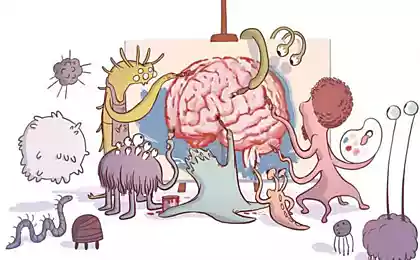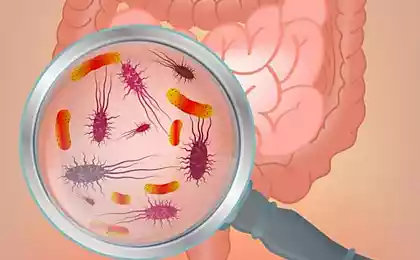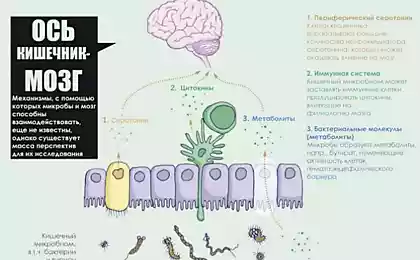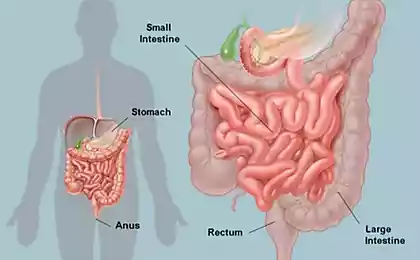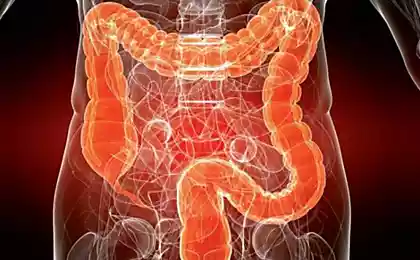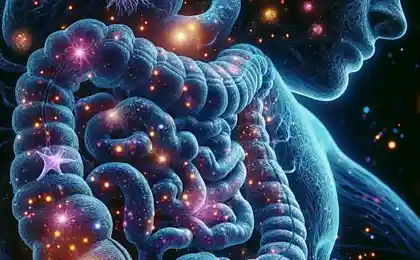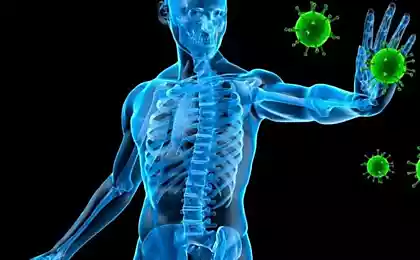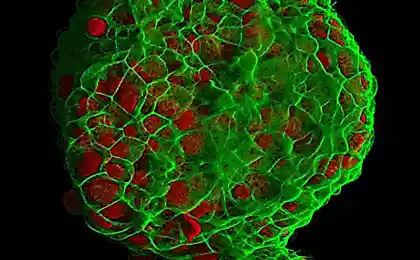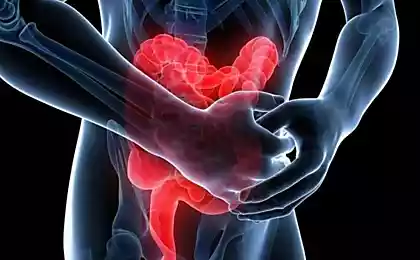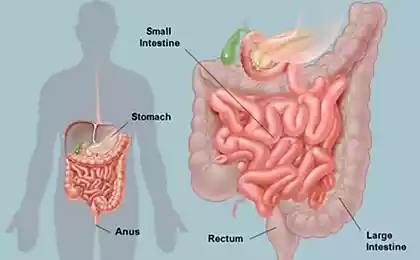171
How to normalize the intestinal microflora
The totality of bacteria in the human intestine (microbiome) has an average of about 50 trillion microorganisms and can weigh up to 1.5-2 kilograms! This is thousands of times the population of the Earth and 1.3 times more than the total number of all cells in the body.

DepositPhotos
These are bacteria, viruses, fungi and archaea (which are mistakenly classified as bacteria). Of all the cells in the human body, only 43% are human cells. The rest are microscopic colonizers.

DepositPhotos
Gut microbiome It is strictly individual, like fingerprints, it reflects who your parents were, who you are close to, what you eat, what you do (whether you are in contact with the ground, for example), and much more.
It would be wrong to think that such a number of microbes in our body does not affect its work. It is known that the microbiome takes an active part in digestion, regulation of the immune system, protection from disease and the production of vitamins.
Disruption of the balance of the microbiome can lead to a predisposition to intestinal diseases, and recent animal studies reveal the mechanism of this connection.
878799
DepositPhotos Exclusion of fiber from the diet of experimental mice led to a decrease in the number of microbes that feed on fiber. As a result, they were replaced by bacteria that feed on the intestinal mucosa.
A similar mechanism in the human body makes it more susceptible to infections such as colitis (inflammation of the colon) and increased intestinal permeability.
360.46
DepositPhotos
However, the case is not limited to that. Intestinal bacteria control our emotions and behavior, stimulating the production of certain hormones. The amazing discovery is that up to 50% of serotonin and up to 90% of dopamine (called the hormones of joy and pleasure) are produced in our gut.

DepositPhotos
Bacteria can affect the food preferences of the host, forcing them to eat foods that contribute to their growth and reproduction. Some bacteria like fat, some like sugar, and their preferences have to pay the owner.
Microbes can control the host’s eating behavior in many ways: they interfere with the reward system in the brain, change the sensitivity of taste buds, produce mood-altering substances, and break signals from the gut to the brain through the vagus nerve.
How do we make bacteria work for us, making us feel better and really happy? The easiest way to optimize the microbiome is through nutrition.
Normalization of intestinal microflora "Site" It will tell you about nine changes in your diet that will contribute to the health of the intestines.
For good work, the intestine needs a diverse and complete diet. An ideal example of a balanced diet is the Mediterranean diet, which is actively supported by many Hollywood stars.
Ivy oatmeal is cooked for a long time, but it perfectly envelops the intestines. Editorial "Site" It will tell you which oatmeal is the most useful, how to find it and why you need to start your day with it.

DepositPhotos
These are bacteria, viruses, fungi and archaea (which are mistakenly classified as bacteria). Of all the cells in the human body, only 43% are human cells. The rest are microscopic colonizers.

DepositPhotos
Gut microbiome It is strictly individual, like fingerprints, it reflects who your parents were, who you are close to, what you eat, what you do (whether you are in contact with the ground, for example), and much more.
It would be wrong to think that such a number of microbes in our body does not affect its work. It is known that the microbiome takes an active part in digestion, regulation of the immune system, protection from disease and the production of vitamins.
Disruption of the balance of the microbiome can lead to a predisposition to intestinal diseases, and recent animal studies reveal the mechanism of this connection.
878799
DepositPhotos Exclusion of fiber from the diet of experimental mice led to a decrease in the number of microbes that feed on fiber. As a result, they were replaced by bacteria that feed on the intestinal mucosa.
A similar mechanism in the human body makes it more susceptible to infections such as colitis (inflammation of the colon) and increased intestinal permeability.
360.46
DepositPhotos
However, the case is not limited to that. Intestinal bacteria control our emotions and behavior, stimulating the production of certain hormones. The amazing discovery is that up to 50% of serotonin and up to 90% of dopamine (called the hormones of joy and pleasure) are produced in our gut.

DepositPhotos
Bacteria can affect the food preferences of the host, forcing them to eat foods that contribute to their growth and reproduction. Some bacteria like fat, some like sugar, and their preferences have to pay the owner.
Microbes can control the host’s eating behavior in many ways: they interfere with the reward system in the brain, change the sensitivity of taste buds, produce mood-altering substances, and break signals from the gut to the brain through the vagus nerve.
How do we make bacteria work for us, making us feel better and really happy? The easiest way to optimize the microbiome is through nutrition.
Normalization of intestinal microflora "Site" It will tell you about nine changes in your diet that will contribute to the health of the intestines.
- Diversity
Eating a wide range of different products, especially plant ones, will ensure maximum diversification of intestinal bacteria. It is best to lean on foods with dietary fiber. And the more ingredients are in the dishes on your table, the better.
DepositPhotos - Fresh vegetables and fruits
Increase your intake of fresh vegetables and fruits to optimize your fiber intake and provide a variety of bacteria. Green leafy vegetables contain a certain type of sugar that feeds beneficial gut bacteria, which in turn helps displace harmful microbes. This sugar, sulfoquinose (CX), is produced by plants during photosynthesis.
Some microbes in the gut specialize in fermenting soluble fibers from fruits and vegetables, and the byproducts of this fermentation help nourish the cells lining the colon.
Thus, they prevent problems associated with increased intestinal permeability. The most important byproducts of fermentation are short-chain fatty acids, such as butyrate, propionate and acetate.
DepositPhotos - Fermented foods
Eat fermented foods – the latest scientific evidence proves that they are rich in beneficial bacteria that thrive in the gut. These products include soaked apples, sauerkraut, kimchi (Korean snack of sauerkraut vegetables), Japanese soybeans natto.
DepositPhotos - Prebiotic products
Bacteria live in the lowest part of our digestive system – the large intestine. Before that, food passes through other departments, is digested, and only what remains undigested goes to bacteria. And most of the food for bacteria in this sense are substances-polysaccharides, we also call them prebiotics.
These include persistent starches found in immature bananas, papayas and mangoes, as well as seeds, potato starch, brown rice flour and shirataki noodles.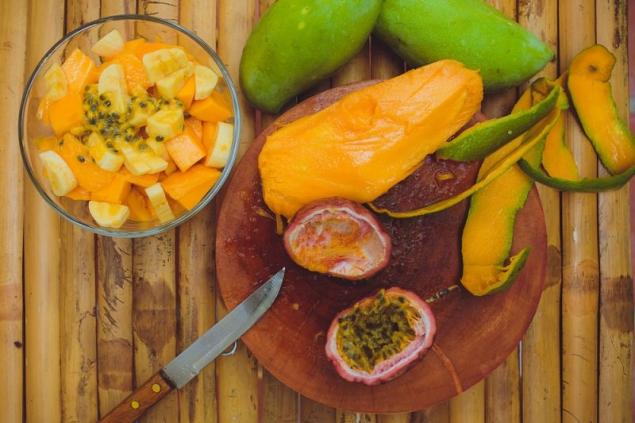
DepositPhotos - Fiber supplements
Think about taking fiber supplements. For fiber to bring health benefits, it must be consumed in an amount of 25-50 g per 1,000 calories consumed. If you are not getting enough fiber with nutrition, consider taking organic husks of plantain seeds, flax or chia seeds.
DepositPhotos - Foods rich in polyphenols
Eat foods rich in polyphenols. Like prebiotics, polyphenols help feed beneficial gut bacteria. Rich sources include cocoa (black chocolate), grape skin, matcha tea, onions, blueberries, broccoli and pomegranate seeds.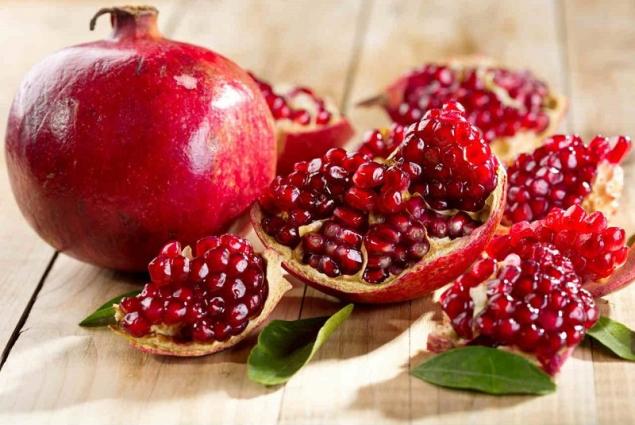
- High-quality supplements – probiotics
Take high-quality Food Supplements - Probiotics. To make them quality and effective, look for supplements, strains of bacteria that are able to survive in gastric juice and bile to get into the intestines in sufficient quantities. The activity of probiotics should be guaranteed throughout the entire production process, storage period and shelf life of the product.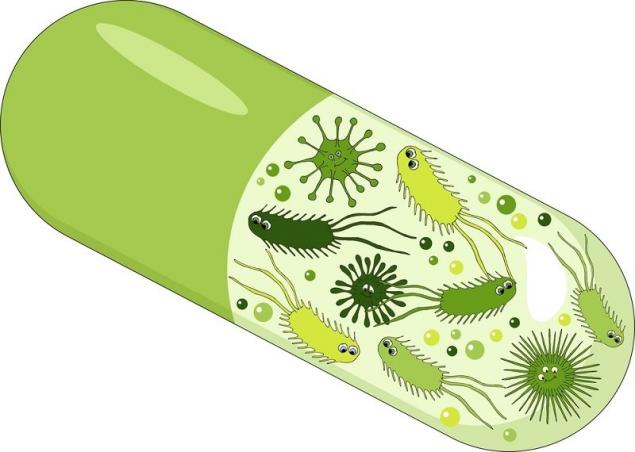
- Avoid monodiet
Avoid monotonous diets (monodiet). Because of them, as well as because of products with preservatives and antibiotics, the diversity of bacteria in the body decreases, and as a result, this increases the risk of obesity and digestive problems. - Eliminate artificial sweeteners from the diet
Studies show that aspartame in the gut increases levels of disease-causing bacteria such as Clostridium and Enterobacteriaceae.
For good work, the intestine needs a diverse and complete diet. An ideal example of a balanced diet is the Mediterranean diet, which is actively supported by many Hollywood stars.
Ivy oatmeal is cooked for a long time, but it perfectly envelops the intestines. Editorial "Site" It will tell you which oatmeal is the most useful, how to find it and why you need to start your day with it.









